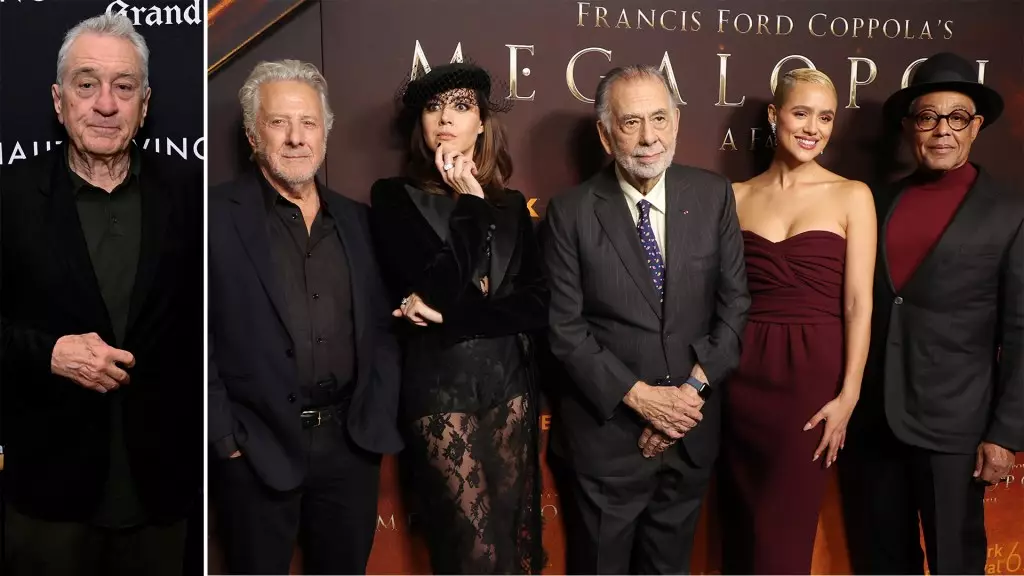At the New York premiere of Francis Ford Coppola’s highly anticipated film *Megalopolis*, a wave of laughter swept through the audience as renowned actor Robert De Niro delivered a dry, sarcastic observation. His remark, “Just imagine Donald Trump directing this film,” showcased his unique talent for merging humor with serious undertones. Despite the laughter it incited, De Niro’s expression remained unyieldingly serious as he elaborated on Trump’s potential incompetence in managing complex narratives, both in film and governance. This moment illustrated not only De Niro’s comedic prowess, but also his continuous engagement with the socio-political landscape, further solidifying his status not just as an actor but as a provocateur.
The event held significant weight, featuring not just De Niro but also Spike Lee, another heavyweight in American cinema, alongside Coppola himself. Each of these icons participated in a half-hour Q&A session, drawing parallels between the film industry’s challenges and contemporary political dynamics. Such moments of reflection are vital in a world where film is often a mirror to society’s larger issues.
The intertwining of art and politics was palpable during the Q&A. As De Niro and Lee delved into discussions about *Megalopolis* and its parallels to the current political climate, the atmosphere shifted to one of urgency. De Niro, in particular, expressed deep concerns about what he perceives to be a decline in democratic values, reminiscent of themes prevalent in Coppola’s cinematic work. “It’s not over ‘till it’s over,” he stated, an assertion that resonated not just as a sports metaphor but as a chilling reminder of the ongoing battle for political integrity in America.
Lee echoed this sentiment, emphasizing the importance of civic engagement. His reminder to “register to vote and show up” was a call to action that underscored the stakes involved in the upcoming elections. The endorsement of active participation in democracy from two culturally significant figures is a potent reminder that the arts should not be divorced from political engagement.
As the discussion progressed, Coppola revealed his intention in casting a diverse array of political perspectives within *Megalopolis*. By incorporating actors with different political beliefs, he highlighted the ability to foster dialogue and growth, even amid disagreement. This artistic choice can be seen as a parallel to the democratic process itself, where multiple viewpoints converge to create a richer narrative.
The conversation took a nostalgic turn as the trio reflected on their storied careers and their connections within the New York film scene. De Niro and Coppola reminisced about their work on the iconic *The Godfather*, while Lee shared memories of his early experiences in the film industry. Beyond the political dialogue, these recollections emphasize the significance of collaboration and camaraderie in filmmaking, showcasing how personal relationships build the foundation for creative endeavors.
Coppola’s *Megalopolis* has been a decade-long passion project, a journey laden with obstacles and aspirations. Once viewed as an ambitious dream, the film finally took shape with the backing of Lionsgate, who acquired U.S. distribution rights months before its premiere. The commitment from Coppola, who financed the considerable $120 million project through his own resources, speaks volumes about his dedication to the film and belief in its potential impact.
Although the initial critical reception at Cannes was mixed, the film remains a testament to Coppola’s indefatigable spirit and creative vision. The actors involved, boasting notable talents like Adam Driver and Shia LaBeouf, contribute to a star-studded cast that embodies the diverse fabric of American cinema. Such a blend of talent raises expectations and intrigue surrounding the film’s eventual release.
As the evening drew to a close, it was clear that *Megalopolis* represents more than just a cinematic endeavor; it embodies a commentary on the current state of society. The discussions led by De Niro and Lee not only emphasized the importance of artistic expression in addressing political issues but also the necessity for every citizen to engage actively in the democratic process.
In a society increasingly characterized by division, the collaboration of these three prominent figures serves as a reminder that through the medium of film, pressing societal issues can be illuminated. The laughter shared at the premiere may have masked serious undertones, but the event ultimately encapsulated a collective desire to advocate for change, urging audiences to recognize their responsibility not only as spectators of art but as participants in democracy.

Leave a Reply